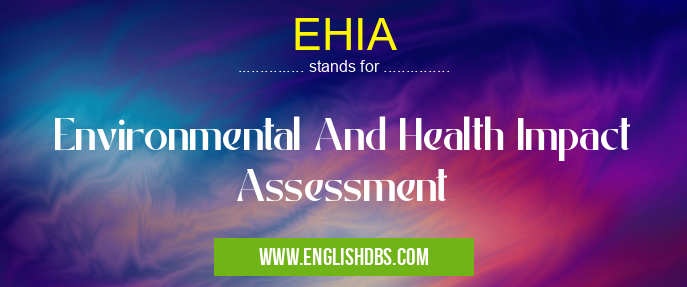What does EHIA mean in HEALTHCARE
Environmental And Health Impact Assessments (EHIAs) are an important part of determining the potential impacts of a project or policy on both human health and the environment. These assessments are conducted to identify, evaluate, and mitigate any potential negative impacts to the environment and health that could result from a given project or policy. The goal of EHIAs is to ensure that any changes made do not cause harm to either people or the environment in the long term. By considering potential environmental and health impacts ahead of time, it is possible to create a plan for how best to prevent, minimize, or mitigate such impacts so as to reduce their severity in case they do occur.

EHIA meaning in Healthcare in Medical
EHIA mostly used in an acronym Healthcare in Category Medical that means Environmental And Health Impact Assessment
Shorthand: EHIA,
Full Form: Environmental And Health Impact Assessment
For more information of "Environmental And Health Impact Assessment", see the section below.
» Medical » Healthcare
Definition
Environmental And Health Impact Assessment (EHIA) is defined as an evaluation process used by government agencies and other stakeholders in order to assess the potential environmental and public health impact of a proposed project or policy prior to implementation. An EHIA can include an examination of any expected physical, chemical, biological and/or social effects on humans and ecosystems surrounding or affected by the implementation of said project or policy. Such assessments may also consider any short-term or long-term environmental impacts associated with proposed activities that may potentially increase exposure risks for local populations.
Essential Questions and Answers on Environmental And Health Impact Assessment in "MEDICAL»HEALTHCARE"
What is an EHIA?
An Environmental and Health Impact Assessment (EHIA) is a comprehensive assessment of the potential environmental or health-related impacts a proposed project or development might have on its surroundings. This assessment helps decision makers consider potential impacts when weighing different alternatives, so that they are able to make informed decisions.
What is the purpose of an EHIA?
An EHIA serves two main functions: first, to identify and assess any negative impacts the project may have on the environment or public health; and second, to develop measures for minimizing those risks and enhancing positive impacts through prevention or mitigation strategies.
Who conducts EHIAs?
EHIAs are usually conducted by independent consultants who specialize in environmental protection, public health, or both. The consultants draw on data from local authorities and research studies to complete the assessment.
How long does it take to do an EHIA?
The amount of time required to complete an EHIA will depend on the size and complexity of the project. Smaller projects can typically be completed in a few weeks while larger projects may require several months of work.
What types of projects require an EHIA?
Any large-scale project that has potential impacts on the environment or public health should be evaluated via an EHIA process. For example, this could include new infrastructure developments, industrial plants, urban redevelopment sites — as well as activities like mining, logging, farming and trawling.
Is there any legislation governing EHIAs?
Yes! Each country sets its own regulations surrounding Environmental Health Impact Assessments according to local standards for impact assessment — so these vary depending on location.
How can I ensure my project meets all relevant legal requirements?
Prior to starting your project you should research any relevant legal requirements related to environmental protection or public health concerns in your area — then ensure that you meet all applicable rules throughout your project's duration and beyond. Additionally consulting with a qualified specialist can help ensure compliance with regulations during your project's progression.
What kind of evidence is needed for an effective assessment?
Good quality scientific evidence is essential for carrying out accurate assessments — this involves gathering data relating to environmental conditions before and after implementation of any changes made by the proposed action as well as assessing expected future trends in these areas based off current evidence provided.
Are there any limits for acceptable risks identified during an EHIA process?
Generally speaking risk thresholds vary depending upon many factors such as country specific regulation regarding acceptable levels risk, expected duration of project effects or intensity of impact etc., but overall it is important not to accept risks which could potentially lead to major incidents due to failure at some point in time during project execution.
Final Words:
EHIAs are a valuable tool for making sure that projects and policies are implemented in a way that does not result in significant adverse impacts on our natural environment and public health. Through careful consideration of its potential environmental and health implications before implementation, we can ensure that our actions will minimize harm instead of creating more unnecessary burdens for ourselves down the road.
